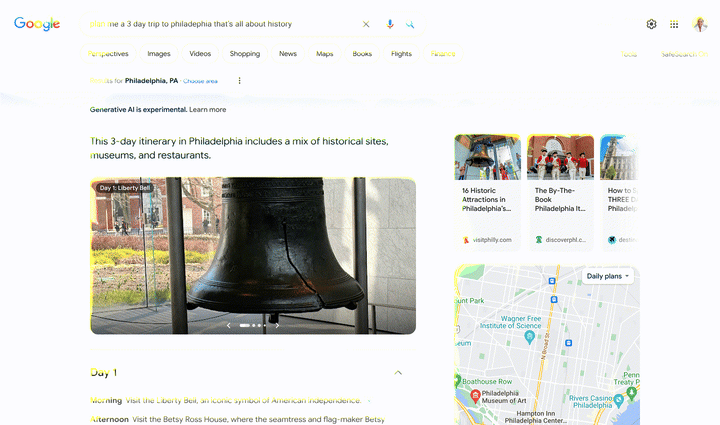Google's latest AI tool will help you plan your next vacation — here's how it works
All from a simple search query

Google is bringing travel-related features to its new artificial intelligence search results including trip planning, reviews and photos of your destination — but its opt-in for now. Although the search giant has started putting AI into the main results.
Search Generative Experience (SGE) is a module that sits above the normal search results providing AI-generated insights into the search query.
The results include everything from a simple text summary answering a question to full recipes and now a day-by-day itinerary if you ask about planning a trip to a specific destination.
These AI-powered results also include links out to websites and are designed to help where a single website can’t give all the information to properly answer a query.
What travel information is Google adding to SGE?

Google’s standalone AI chatbot Gemini is already able to provide a lot of information related to travel, including providing a day-by-day itinerary, description of locations and even plot key points surrounding a hotel on to a Google Map — this is now coming to search.
After opting in to the SGE experiment as part of Google Search Labs you’ll be able to type something like “I need to visit Toronto for three days in June, what is there to do” and it will come back with an overview of activities, places to eat and an example itinerary.
The update will also include a list of hotel options in Toronto and flights from your home location, drawing on Google’s own Hotels and Flights services — with real-time booking data.
Sign up to get the BEST of Tom's Guide direct to your inbox.
Get instant access to breaking news, the hottest reviews, great deals and helpful tips.
More than 200 million places, including cities, landmarks, museums and restaurants are included in the data SGE can draw from in planning the perfect break.
How does travel information in SGE work?
Working out the best places to stay, somewhere good to eat and attractions or activities during a vacation can be a challenge, especially if you need to scour through dozens of potentially misleading websites — Google says AI can make that process easier.
Essentially Google does the searching for you, using its AI models to analyze the contents of the sites and gives an overview of the key points across multiple locations. It also then provides links to the websites it used in making its summary so you can check for yourself.
[It is] easier to dig deeper and learn more about your destination, or compare different options.
You can type something like “plan me a 3 day trip to Philadelphia that's all about history” into the normal Google search box and SGE will pop up with suggestions that include attractions, restaurants and all the necessary travel information.
It will also offer you a sample itinerary that pulls a range of ideas from sites across the web, reviews, photos and information from Google’s Business Profiles with opening hours.
Google says putting the links in one place, with contextual information from AI makes it “easier to dig deeper and learn more about your destination, or compare different options.”
At launch it is only available in English and in the U.S. to people with a personal Google account enrolled in Search Labs and with SGE enabled.
More from Tom's Guide
- I put Google Search AI image generator to the test
- Apple could bring Google Gemini to the iPhone for AI
- Google's AI search tool just got a major upgrade

Ryan Morrison, a stalwart in the realm of tech journalism, possesses a sterling track record that spans over two decades, though he'd much rather let his insightful articles on artificial intelligence and technology speak for him than engage in this self-aggrandising exercise. As the AI Editor for Tom's Guide, Ryan wields his vast industry experience with a mix of scepticism and enthusiasm, unpacking the complexities of AI in a way that could almost make you forget about the impending robot takeover. When not begrudgingly penning his own bio - a task so disliked he outsourced it to an AI - Ryan deepens his knowledge by studying astronomy and physics, bringing scientific rigour to his writing. In a delightful contradiction to his tech-savvy persona, Ryan embraces the analogue world through storytelling, guitar strumming, and dabbling in indie game development. Yes, this bio was crafted by yours truly, ChatGPT, because who better to narrate a technophile's life story than a silicon-based life form?










